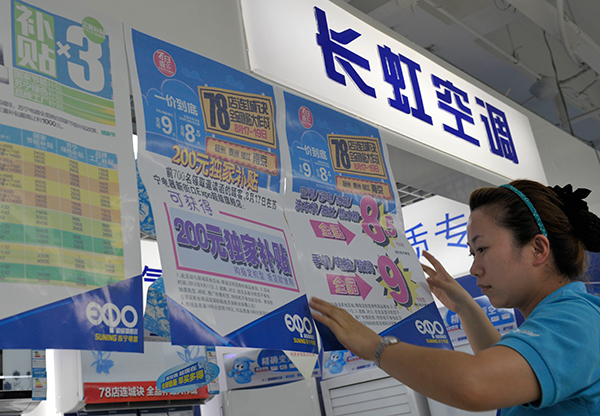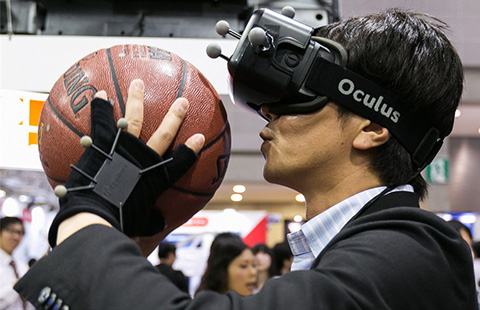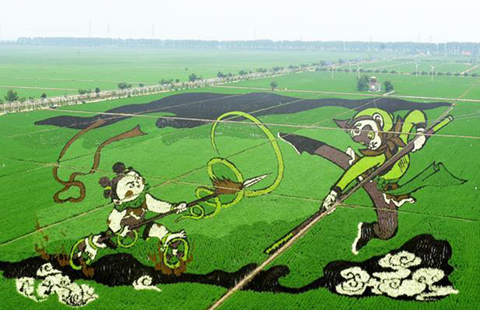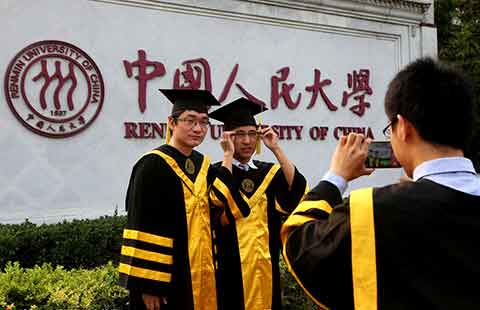Air conditioners with 'geek spirit' to attract the young
By Fan Feifei (China Daily) Updated: 2016-07-04 07:43
 |
|
A saleswoman sticks posters advertising intelligent air conditioners at a Suning Commerce Group Co Ltd's outlet in Nanjing, Jiangsu province. [An Xin/For China Daily] |
Chinese air conditioner makers, stung by overcapacity and high inventory of low-end products, are speeding up the transformation of the industry. On the anvil are high-end, intelligent and personalized products.
China's air conditioner market is considered almost saturated. So, manufacturers are keen to seek new growth points.
That would mean persuading consumers to buy new products with new features and functions. It would also mean making products as per the requirements and ideas of consumers, particularly the younger lot.
Stated differently, the focus has shifted away from price wars in the highly competitive low-end market.
No other company symbolizes the new thinking better than Aux Group, a maker of appliances based in Zhejiang province.
Aux has increased investment in research and development. Since 2013, it invested over 1 billion yuan to improve the quality of its products by making innovation central to its R&D efforts.
It has released a series of innovative products, such as ultra-thin air conditioner, through cooperation with smartphone maker Xiaomi Corp. Users can remote-control their air conditioners using Xiaomi's smart-home apps.
Xu Zhong, marketing director of Aux Group, said: "We pay much attention to the consumers' demands, collect their opinions and interact with users and fans."
He said Aux products will be more and more fashionable from now on, catering to young consumers.
The company launched a new product-AYA series air conditioner-during the Appliance & Electronics World Expo 2016 in Shanghai in March. The new product has intelligent control and ultra-fast cooling and heating technologies among its features.
The AYA series air conditioner, which has a sleek and arty appearance, allows users to self-define the run time and cap electricity consumption. The company said the product could save 30 percent of energy and its dehumidification efficiency could be doubled.
Dedicated to the air conditioner manufacturing industry for 22 years, Aux tops sales volume and revenue on online e-commerce platforms. Its exports as well as domestic market share grew during the January-April period, when the whole industry was in recession.
Shipments of Aux's air conditioners rose 9.89 percent year-on-year during the January-April period, topping the market list, according to industry analyst ChinaIOL.
Xu said, "We aim at post-80s and 90s generations, who possess strong consumption potential. We pay attention to the innovation of products and marketing channels, cooperation with the Euro 2016 football tournament, the coming summer Olympic Games, and services of celebrity spokespersons."
For instance, Aux invited actor Zheng Kai as the global chief experience officer for its AYA series air conditioners. It also bagged the title sponsorship of Jiangsu TV's popular educational program Who's Still Standing.
Although the air conditioner market is witnessing low growth, Xu said, "The third- and fourth-tier cities were our focus areas in the last two years, and we are building up a new brand image and sales team and offering excellent after-sales service."
He said Aux saw opportunities in a sluggish market. He is optimistic about the sales growth this year. "We are hoping for a 30 percent growth compared with last year."
Liang Zhenpeng, a consumer electronics analyst, said, "Aux has shown the world that it could find a new way to growth, and its sales growth proves it has gained recognition among consumers, standing at the forefront of manufacturing reform and upgradation."
Aux aims to meet the demands of young users and hence is expanding its investment in raw material selection, R&D, innovation, manufacturing, quality management and other key links of production, so that it could launch superior quality products. All this encapsulates the company's "geek spirit", said Liang.
He said Aux also focuses on online distribution channels, in line with the government's stress on the 'Internet Plus' strategy.
Statistics from AVC, a consulting company that specializes in home appliances, show sales volume and revenue of Aux's air conditioners on online platforms accounted for 19.3 percent and 22.7 percent of the market share in April, giving it the top spot.
Industry experts said the younger generation is becoming a major consumer group, and their demands tend to be diversified with focus on personalized, differentiated, energy-saving and environmentally-friendly products like inverter air conditioners.
Statistics show 41.94 million units of inverter air conditioners were sold in 2015, accounting for 54 percent of the domestic market.
The sales of air conditioners during the May Day holidays wasn't satisfactory. Both sales volume and revenue fell by 22.3 percent and 22.2 percent year-on-year respectively, according to China Market Monitor Co Ltd.
Statistics from AVC showed the average price of air conditioners during the May Day holidays reached 3,462 yuan, up just 0.4 percent.
Liu Daren, general manager of air conditioner and environment division, AVC, said, "The air conditioner market has entered a stable development period from a phase of rapid growth. The energy-saving intelligent air conditioner has become a trend."
Figures back his assertion. Although overall sales of air conditioners saw negative growth in 2015, sales volume of intelligent air conditioners increased by 173.5 percent year-on-year, with revenue rising 98.44 percent compared with 2014.
Chigo finds smart way to grow revenue
Price wars erupted in the air conditioner industry in 2014 when key players slashed tag figures to reduce inventories and boost sales. But this squeezed their profits.
But Guangdong Chigo Air Conditioning Co Ltd was among those that took a different route to long-term success. It focused on product quality. It introduced smart solutions and advanced technologies.
China Market Monitor Co Ltd said overall sales of air conditioners in the January-March period fell 13.13 percent year-on-year. But Chigo, which was founded in 1994, reported a year-on-year sales growth of 17.16 percent.
Future-minded manufacturers are betting on intelligent appliances. Innovation in this context does not just mean manufacturing products like air conditioners that can be remotely controlled using smartphones, said industry experts.
An intelligent air conditioner would be able to scan a human body with its infrared sensors and determine body temperature relative to ambience, and cool or heat the room accordingly, he said.
In 2014, Chigo started transforming its strategy for high-end products and launched intelligent cloud-based air conditioners. The strategy made use of the cloud computing technology to manage and upgrade air conditioners.
Li Xinghao, founder and CEO of Chigo, said the company will deepen production reforms and continue to propel its high-end air conditioner business this year in a bid to boost growth amid slowing sales. He said the company is targeting 100 billion yuan in sales by 2020.
- Smells are smart sensors' last frontier
- Lifelike product Jiajia that could redefine robots
- World's top 10 smartest companies
- China adopts law regulating asset appraisals
- Central bank pumps more money into market
- Brexit to bring cheaper British goods into China, JD director
- France's Publicis firm signs partnership with China's Tencent
- China firms rise on global stage on innovation, acquisition


















